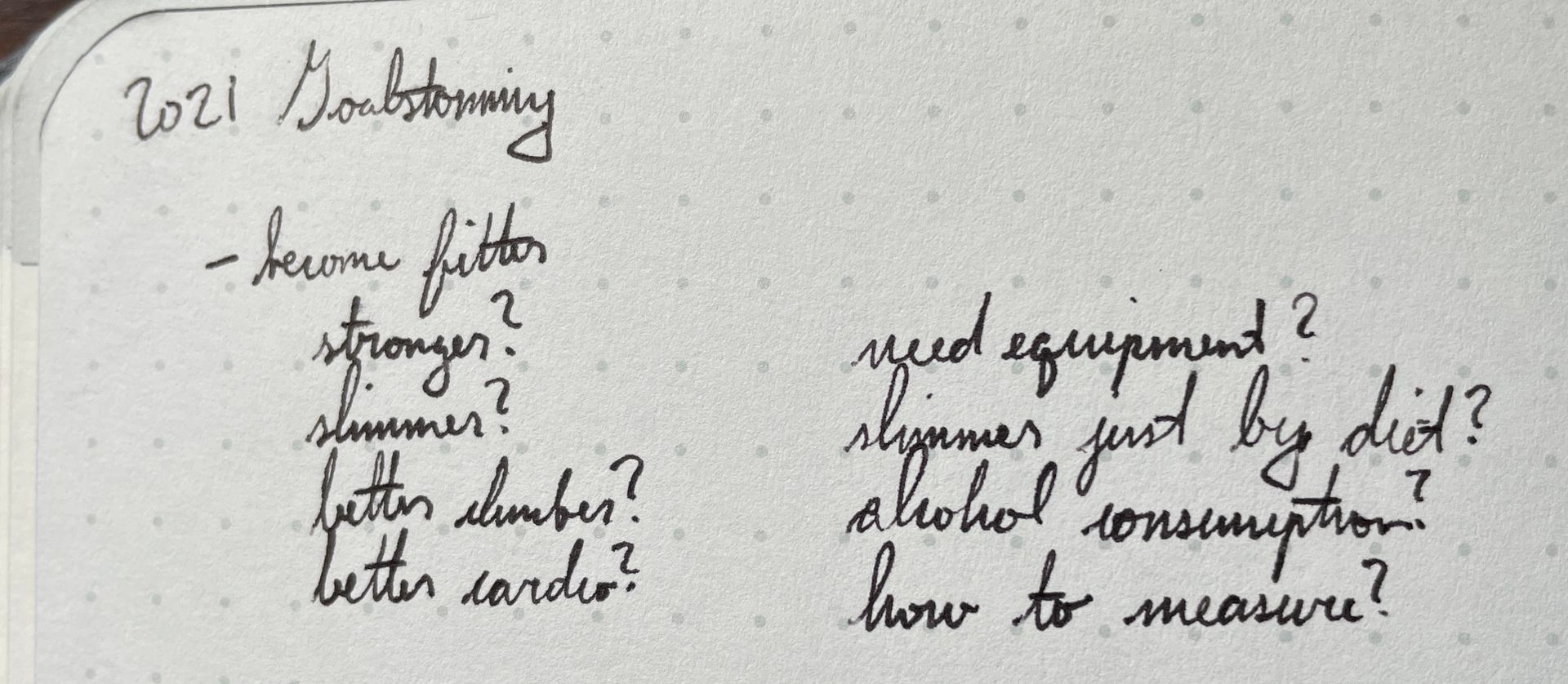I could go on and on about how 2020 was a bad year and it's time to turn the page, but I don't think I need to. It's also been 6 months since 2020 ended. I could tell you about how you won't stick to your New Year's resolutions and that it's hopeless, but I don't think I need to. You probably didn't stick to them. And I don't think I can say with any conviction that 2021 will be better than 2020. All I can tell you is that you have the power to make your 2021 a productive year, no matter what happens around you. And that's even knowing that the year is half over.
There are so many things you can do to improve your life by just a little bit, like keeping a water bottle by your bed or taking a moment a few times a day to check in on yourself. But we rarely think about this level of change when we look to improve ourselves. We like to think big, like "I'm going to travel more" or "I'm going to go to the gym every day". But these goals have serious problems, and from experience I can tell you that failing in your grand plans can be psychologically destructive.
The signs of a good goal
Everyone will tell you this kind of information in a different way, but it doesn't mean they're wrong. It just means that it doesn't click for certain people until they've heard it in a way that resonates with them.
The best thing you can do for a new and improved you is to set goals. These goals should:
- Be easily defensible when someone asks you "Why?"
- Have a reasonable end date
- By measurable
- Be challenging, but realistically so
- Have a specific process by which you'll accomplish the goal
A goal that fails any of the above has an excellent chance of never happening. All of these are absolutely essential for tracking progress and making sure you don't lose motivation.
How not to wake up early
A few years ago I decided that I wanted to start waking up earlier. All the online personalities were doing it and raving about the results, so I thought I should give it a try. Without much thought, I made a goal:
I will wake up at 5:30 every morning.
That was it. I changed my alarm and dreamed about how much more I'd get done in the day. I already knew that goals should be measurable, and this one was! But I failed the other components.
- There was no end date. I could never say that I had accomplished my goal, only that I was still working towards it.
- It was not easily achievable, in 2 ways. My previous sleep schedule was roughly 11:30 to 7:30, so this was an immediate 2 hours shift. And my girlfriend was a night owl, so I'd usually hang out with her until I went to sleep. I'd be losing large parts of my time with her if I was turning down for sleep at 9. It might have been an appropriate level of difficulty for me, but I was dragging her into this, as well.
- The real kicker: it wasn't easily defensible. I wanted to be more productive, but I didn't have a plan for those morning hours and I couldn't tell you why the morning hours were the time for me to try to do it.
I made it about 3 weeks before realizing that this hadn't been a positive change. With no plan for my mornings, I turned to social media and become extremely unhappy. I started feeling like I was losing out on my social life and started staying up past my bedtime to hang out with friends, causing me to sleep far fewer hours than I needed.
Defend your goal
Let's say your grand plan can be described in the ever-present goal:
I want to lose weight.
This is a bad goal. But you can make it good. And since I do actually want to lose a few pounds, I'll put my actual goals in the sections below as I walk through how to make this goal achievable.
Let's start with the most important part of your goal: your motivation.
A goal is trivially defensible when you're honest about what you actually want to achieve. Too many people say they want to lose weight for health reasons but are actually upset with the way they look. But they don't know how to phrase that in a way that doesn't sound narcissistic.
They need to embrace that narcissism. If their true motivation is in their appearance, that's the message that will keep them from that stack of cookies, not their health concerns. You need to be able to justify the goal to yourself every single time you consider straying from it. In your weakest hour, drunk and peckish, you need to be able to say "no" to the pizza menu on your fridge. You need to get to the core of why you are trying to make this change in your life or you'll never resist temptation when it calls.
Some things are harder to defend
Skill acquisition can be hard to explain. Why do you want to take up whittling? You think it's fun? Cool? It's unlikely you have a good explanation, but you still need one that's good enough to convince yourself to keep going. You'll rarely do something for the sake of learning a skill. Maybe you want to whittle so you can make little trinkets for your kids someday, or because you think it's a way to be known for something, or because a cute person at the bar mentioned they thought it was hot. No matter how selfish your reasoning, you need to acknowledge and accept your motivation as quickly as possible.
It can also be extremely hard to defend a goal around something you're very good at. You'll be asked why you want to push on something you've already mastered. In their minds, you've already achieved any goal someone could set in that field. Maybe you've already run a 5 minute mile, or painted extremely lifelike portraits. But if you really want to get better at something, it doesn't matter how far you've come already: there will always be room for improvement. If the idea of improvement is motivating to you, keep it up!
In my case, I want to lose weight because I would like to run a half marathon this year and I think being lighter will help me run with less effort. It will probably be easier on my joints, as well. But the underlying motivation is that I don't know if I'm "healthy", and being able to run a half marathon would be something that would have never been possible even back in my sports-playing prime.
I'd like to lose 15 pounds because it'll be easier to run long distances if I'm a little bit lighter. I want to run a long distance because I don't trust that I'm healthy and capable to improving my physical state, and running long distances is one thing I've never been able to do before.

Picking an end date
Humans rarely keep goals that last a year. We generally can't make it 6 months. I've joked with coworkers before that goals change every time the weather changes, but I really do think this holds true. As the weather changes, so do our motivations. Summer months are bright for long hours and encourage us to go outside and do things, while in the winter it gets dark and we stay inside where it's warm. We even eat different things at different times of year. "Hearty" meals are for cold days, while on hot days we prefer salads and fruit (or, prefer more than in the winter).
I think 3 months is the upper end of a reasonable goal, and 1 month is the lower end. You need to give yourself enough time to fail and get back on track, and you need to make sure the end date is close enough that you don't give up if you do decide that goal isn't for you.
In my example, I want to lose 15 pounds by the time the half marathon rolls around, which is sometime is September. That's too far away, so I need an intermediate goal or it'll never happen. If I can't achieve the initial weight drop, it'll be impossible to achieve the rest. So I'm setting myself an ambitious initial goal, with the intentions of making subsequent goals that are more reasonable. Given my current activity levels, weight, eating and sleeping habits, and previous activity levels, I'm going to give myself about 6 weeks to achieve my first weight goal.
I want to achieve my weight loss goal by July 4th.
4th of July is a major holiday in the US, so it provides a natural break in activities. And if I achieve my goal by then, I can socialize with friends guilt free!
How to measure
This one is the hardest. The goal is aspirational until you get a number in your head and realize it may be achievable. Finding this number requires some thinking and maybe even some research. Once you pass this step, you've invested in the goal and are ready to start.
One caveat here is that this step is intrinsically linked to the next two. You can't know what to measure before you know what's reasonable, and you won't know what's reasonable until you know what steps you're willing to take to get there. I still think this is the more important of the steps to be able to vocalize, so I'm putting it above the other two.
And similarly to being able to defend your goal, measuring certain skills will be hard. You may have to measure the number of hours you spend whittling instead of the number of items you produce. What if one item is extremely large and took you a very long time to complete? You would have failed your goal but still taken every step you intended to.
The rule with weight loss seems to be: 2 pounds per week is the most you can lose safely. This is a very broad generalization, particularly if you're going back to a previous weight you used to be at, and in particular the first month or two can have significant weight movement as your body tries to adjust to the new lifestyle. Still, I think the most aggressive weight loss plans should only try for those 2 pounds per week for a month, and then change that to 1 pound per week. Your body hates losing weight, and your hormones will start firing to make you feel miserable and get you to eat more food.
You should phrase your measurement system in the simplest possible terms. There should be no doubt as to whether you achieved your goal or not. Don't say you want to "lose a pound-and-a-half every week", or that you want to increase your cycling mileage by 10% this year, tell people what the end goal is:
By July 4th, I want to weigh in at less than 180 pounds.
Is it reasonable?
This is inherently linked to the above and below during the goal-setting process, but I find it quite different when I search for motivation during the goal-achieving process.
If you were trying to learn how to write little programs to make repetitive tasks at your job faster and easier, it might be difficult to explain why you think you can achieve the goal in the amount of time you gave. You may have no experience with programming, and you will still have to perform your normal duties at your job. Some days it will be hard to focus, and some days you'll encounter a concept you just don't understand. How do you know if your timeframe is reasonable?
In these scenarios, I try to break down the goal into even smaller segments that might seem reasonable. I may be inspired by Automate the Boring Stuff with Python and decide to work through that book. You see that they mention 50 videos, so you say to yourself: "I'll just do one per day!" The problem is that life happens. We get sick, get invited out for drinks, or just feel particularly motivated to do something else in that time. And there's no guarantee you'll actually finish one per day, particularly when the concepts get more advanced. The rule here is to double any initial estimate you have, so your goal would be to finish working through all the videos in 100 days. While you really never can be sure if that's enough time, it's pretty close.
You need to be able to explain your goal to a small child:
It will be hard to achieve my weight goal, but because I'm willing exercise every day to not eat ice cream this month to get there, I think I can achieve my goal.
Pick your process
Similar to the above, this section is inherently built into the measurement portion of the goal during planning, but when seeking motivation during your most trying times, you need to know exactly what your plan was and how you're going to achieve it. There can be no loopholes, and this part of the goal may actually need to change over time if you discover something isn't working for you.
If you've made it this far, you probably already know what you're willing to do. You've figured out what's reasonable for your circumstances and have probably thought about the steps to get there. The problem is that most people don't think about this when they set a goal.
Most goals can be achieved in more than one way. You could lose weight by cutting out carbs, or you could lose it by going running more. You could learn a new skill by asking a friend for advice or by using some combination of internet videos to cobble together your information. You could learn about personal finance through books from professionals or through blog posts from people who have had some tough times and are working out of them. The sky is the limit here, but remember that you can't make the steps unreasonable.
In fact, most goals should be achieved in more than one way. It's very difficult to do the exact same thing every day and have it keep working, so you should consider multiple ways to achieve the goal. Particularly for multi-faceted things like weight loss or sleep schedule work, it'll take a village of steps to achieve your goal.
My goals are focused around 2 things: not drinking beer on weeknights and doing more cardio. I'm not too worried about my diet. And I'm not really worried about my snacking because I work really hard to keep snacks out of the house.
I will not drink alcohol on weeknights.
My friend and I made a deal that we'd go to a very specific bar the night bars were allowed to open up to 100% capacity indoors, so this will be an exception to the above. Realistically? It might actually happen. Another exception I need to build in is that my neighbors and I are pretty good friends and sometimes get together to chat and drink a beer. I don't want to sacrifice socializing during lockdown, so I'll allow other people to initiate a beer.
I will drink a full sparkling water bottle of sparkling water before opening a beer.
I'm not going to stock bottles of sparkling water, but I do have a SodaStream. Sometimes I don't actually want the beer, but I want something bubbly and cold. My goal here is to both drink a liter of water and double check that I actually want the beer before opening it.
I will never turn down a cardio activity with a neighbor.
My neighbors are pretty big runners and cyclists. I can't really keep up, but it's fun to go out with them. I've said no a couple times because I was tired (or hungover), but for the next 6 weeks I will never turn down an offer to go on a run, no matter how grumpy I am.
I will not eat any breakfast other than boiled eggs and plain oatmeal.
My breakfasts have started getting out of control and I want to reign them in. Boiled eggs and plain oatmeal are not very pleasant for me but are very easy to make. I also always have them on hand, so I'm hoping this cuts down my consumption significantly.
I will weigh myself every day. Measurements will always be taken without clothes.
Progress must be measured. Weight loss is one of the easiest things to measure, and so I figure I should remind myself as often as possible what my goal is and how I'm doing. I know better than to assign a moral value to the number on the scale so I'll be fine with the daily fluctuations, but I know I need to remind myself to weight in.
Don't be afraid to change your goal
Things happen. Even the best goals and resolutions fall by the wayside when life punches you in the face. My weight loss goal might be interrupted by a sickness, or an injury. My skill learning goal may be put off to the side if I lose my job and need to find a new one. My goal of keeping the house clean if I get distracted by issues in my family.
It's ok to change a goal. If I get hurt, my goal stops being about weight loss and starts being about recovery. If my grandparents start to show their age and decline in health, my goal is to figure out how I can support them. If I get sick and lose a ton of weight very quickly, my goal may change to upping my activity without gaining weight.
This year I wanted to reduce how much stuff I ordered online, so I made a goal of not placing any online order outside of my lunch break. But with the pandemic came a shocking lack of a lunch breaks, and my toilet paper supplies were dwindling. I decided to amend that rule to allow for the purchase of "household essentials" at any time of day, but this rule also went away when I found I wasn't stress shopping at all anymore. My goal was achieved: I wasn't spending frivolously online. It just wasn't achieved in the way I thought it would be.
Closing
Maybe I should have made this a multi-part post. But I think it's valuable to get this information up as people are making mid-year resolutionsgoals so they can take a hard look at what they're really after, and then rewrite them so the change has a chance to stick.
Your goals won't stick. Your goals won't be achieved. But you can find parts of those ambitions and turn them into something real. Every single day, you have the ability to make just the tiniest part of you a little bit more into what you want.
Here's a motivational sunset you for to look at as you go:


